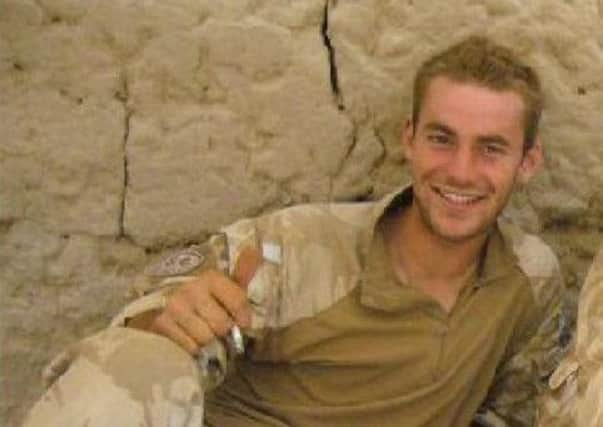Soldier suicides kill more than Afghan weapons


The Ministry of Defence confirmed that in 2012, seven serving soldiers were confirmed to have killed themselves, while a further 14 died in suspected suicides where inquests had yet to be held. The government does not record suicides among former soldiers, but an investigation by the BBC’s Panorama found at least 29 veterans also took their own lives last year.
The total of 50 suicides compares with 40 soldiers who died in action in Afghanistan during the same period.
Advertisement
Hide AdAdvertisement
Hide AdA spokesman for the Ministry of Defence (MoD) said suicide among members of the armed forces was “extremely rare”.
But former senior officers said they believed the issue was worse than was acknowledged.
Colonel Stuart Tootal, a former commander of 3 Para, said: “The evidence suggests there’s more of a problem than the government and the MoD are admitting to.”
The recently retired head of the British army, General Sir Richard Dannatt, has called for the suicide rate among veterans to be monitored. He said: “It’s pretty clear to me that it should be happening, because once you have some statistics you can start to do something about it.”
Labour has been pushing the government to strengthen its military covenant and take the mental health of soldiers more seriously, particularly of those who have served in combat.
Labour’s shadow defence secretary Jim Murphy said: “It is essential that this information is used as the basis for a full assessment of the post-service support our personnel receive, especially mental health support.
“Our responsibility to service personnel does not end after they leave the battlefield. They should not be isolated when tackling the invisible injury of mental health problems caused by exposure to conflict.”
Panorama said it wrote to every coroner in the country to ask for the names of soldiers and veterans who took their own lives last year.
Advertisement
Hide AdAdvertisement
Hide AdThere is added pain for the families of personnel who killed themselves after ending their tours of duty. While the names of those who kill themselves on duty are engraved on a national memorial to military casualties, the same is not done for those who die out of uniform.
Lance-Sergeant Dan Collins, who survived a bomb blast while serving in Helmand province in Afghanistan in 2009, killed himself while still a serving soldier on New Year’s Eve 2011, after suffering with post- traumatic stress disorder (PTSD), the BBC reported. His mother, Deana, told Panorama her son was a “victim of war” and his name should be added to the National Memorial Arboretum in Staffordshire, which honours the casualties of every conflict since the Second World War.
“Soldiers with PTSD are exactly the same. They’re victims of war and they should be treated exactly the same,” she said.
An MoD spokesman said: “Suicide amongst members of the armed forces remains extremely rare and is lower than comparative rates in the civilian population.
“Mental health of our personnel and veterans is a top priority for the government and that is why £7.4 million has been committed to ensure there is mental health support in place for everyone who needs it.”
He also pointed to research published by Kings College London, which shows a lower rate of suicide and self-harm in those who have served in the armed services than the equivalent age group in society as a whole.
The research revealed that the prevalence of reported self-harm in the UK military was 2.3 per cent, lower than the 4.9 per cent reported among the general population.
The MoD spokesman said: “Medical experts working in our armed forces and the NHS are committed to ensuring a smooth transition from the armed forces into the NHS.
Advertisement
Hide AdAdvertisement
Hide Ad“This includes improving the transfer of medical records on discharge to provide better continuity of care and providing mental health assessments prior to discharge.”
However, clinical psychologist Dr Claudia Herbert said PTSD was the body’s “natural response” to distressing events such as combat situations.
She said the condition could take years to emerge, but was treatable if caught early. Symptoms included flashbacks, severe anxiety and depression.
Dr Herbert said: “Post-traumatic stress disorder in itself should not lead to suicide.
“PTSD is a condition that indicates something has deeply disturbed the system and is a warning that the system needs help and needs to regulate again.”
The Kings College study also raised concerns about the effects on regular soldiers who leave active service. The issue has become more acute in the past few years, as the government is making 20,000 soldiers redundant.
Grim statistics
166 Afghanistan veterans are being supported in Scotland by Combat Stress, the organisation that helps personnel and veterans after active duty
90 Iraq veterans are being supported by Combat Stress in Scotland
5,200 total UK caseloads for Combat Stress
7 Known suicides of serving personnel in 2012
Advertisement
Hide AdAdvertisement
Hide Ad14 Suspected suicides of serving personnel in 2012, pending inquests
29 veterans found to have killed themselves in 2012 by Panorama
2.3 per cent suicide and self-harm rate among military personnel, according to Kings College London
4.9 per cent suicide and self-harm rate in the general population for the same age group
134,780 soldiers have been deployed to Afghanistan since 2001
£7.4m committed by MoD to mental health care for service personnel
Case study: Black Watch soldier’s call for help was never answered
BLACK Watch soldier Aaron Black, from Perthshire, was found to have killed himself in December 2011 after leaving the forces.